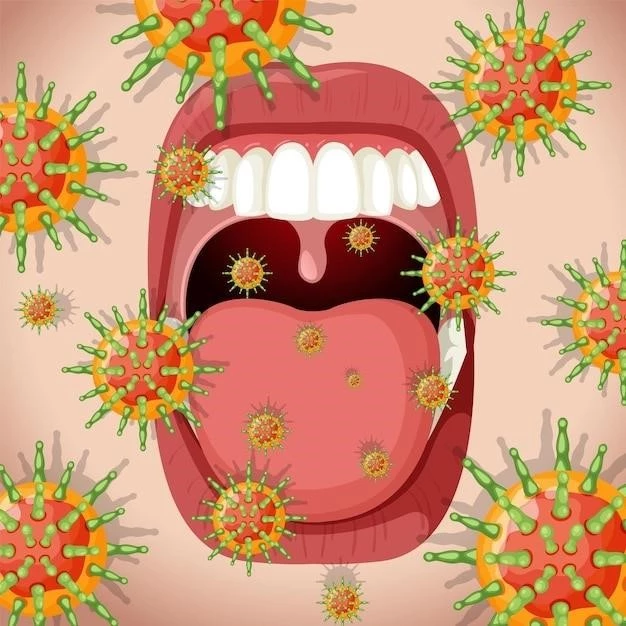Introduction to Stomatitis
Information on stomatitis indicates various causes, such as herpes virus, poor oral hygiene, and systemic diseases.
Stomatitis refers to the inflammation of the mouth’s mucosal tissue, encompassing the inner cheeks, gums, tongue, and throat. The condition can result from multiple factors like infection, irritation, trauma, allergies, or systemic diseases. Common symptoms include pain, mouth ulcers, swelling, burning sensation, and red patches. Diagnosis typically involves swabs, biopsies, or blood tests to identify the underlying cause. Treatment may include mouthwashes, topical corticosteroids, or painkillers, depending on the specific condition.
Definition and Overview
Stomatitis is the inflammation of the mucosal tissue in the mouth, including the cheeks, tongue, and gums. It can be caused by various factors like infections, irritants, trauma, allergies, or systemic diseases.
Herpes Stomatitis
Herpes stomatitis is commonly caused by the herpes simplex virus (HSV-1). This viral infection often presents as painful sores or blisters in the mouth. Treatment typically involves antiviral medications to manage symptoms and reduce viral shedding.
Aphthous Stomatitis
Aphthous stomatitis is typically caused by factors such as poor oral hygiene or mucous membrane trauma. Symptoms include painful ulcers in the mouth, with various triggers like stress, certain foods, or minor injuries exacerbating the condition.
Local Infection as a Cause
Local infection, such as by Candida albicans or bacteria, can serve as a trigger for stomatitis. These infections can affect the mucosal tissues in the mouth, leading to inflammation and discomfort. Proper diagnosis and treatment are essential to manage stomatitis caused by local infections effectively.
Systemic Diseases Linked to Stomatitis
Stomatitis can be associated with systemic diseases like Behçet’s disease, inflammatory bowel disease, and Crohn’s disease. These conditions may contribute to the development or exacerbation of stomatitis symptoms, highlighting the importance of managing systemic health in stomatitis prevention and treatment.
Recurrent Aphthous Stomatitis (RAS) is one of the most frequent oral lesions worldwide, impacting a significant portion of the population.
Prevalence and Incidence
Recurrent Aphthous Stomatitis (RAS) affects a significant portion of the population globally, with varying prevalence rates and an onset typically during the second decade of life.
Clinical Presentation and Diagnosis
Clinically, recurrent aphthous stomatitis (RAS) presents as painful, round ulcers on the oral mucosa, affecting individuals predominantly during the second decade of life. Diagnosis is based on medical history, clinical examination, and the characteristic appearance of the oral ulcers.
Gingivostomatitis
Gingivostomatitis is a painful oral infection that can cause blisters on the lips and canker sores in the mouth. Poor hygiene is a common cause.
Denture Stomatitis
Denture stomatitis, also known as oral stomatitis, is a fungal infection that occurs under dentures. It is often associated with poor oral hygiene and an overgrowth of the Candida fungus in the mouth. Proper denture care and antifungal treatment are necessary to manage this condition effectively.
Chronic Ulcerative Stomatitis (CUS)
Chronic Ulcerative Stomatitis (CUS) is a chronic condition characterized by painful and remitting ulcerations in the oral mucous membranes. The etiology of CUS is not fully understood, making diagnosis and management challenging.
Chronic Ulcerative Stomatitis (CUS)
Chronic Ulcerative Stomatitis (CUS) is a long-term condition characterized by recurring painful ulcerations in the oral mucosa. The origins of CUS are not fully understood, which poses challenges in its diagnosis and management.
Symptoms and Differential Diagnosis
Stomatitis presents various symptoms such as pain, mouth ulcers, swelling, burning sensation, and red patches. Differential diagnosis considers conditions like canker sores, oral thrush, and immune-related disorders.
Medications and Mouthwashes
Treatment of stomatitis may involve the use of medications such as antiviral drugs for viral causes, antifungals for fungal infections, and antimicrobial agents for bacterial causes. Additionally, mouthwashes containing soothing or antimicrobial ingredients can help manage symptoms.
Topical Corticosteroids
Topical corticosteroids are often used in the treatment of stomatitis to reduce inflammation and alleviate symptoms in localized areas of the mouth. These medications can help manage pain and discomfort associated with stomatitis while promoting healing of the affected oral tissues.
Canker sores and oral thrush are potential conditions associated with stomatitis. Canker sores are often linked to specific conditions like celiac disease, while oral thrush, caused by Candida albicans, can result from an imbalance in the mouth’s fungal environment.
Role of Oral Hygiene
Proper oral hygiene plays a crucial role in preventing stomatitis. Regular brushing, flossing, and dental check-ups can help maintain oral health and reduce the risk of developing oral inflammatory conditions.
Genetic Predisposition
Genetic predisposition may play a role in the development of stomatitis, with certain individuals being more susceptible to oral inflammatory conditions due to their genetic makeup. Understanding genetic factors can help identify individuals at higher risk and tailor preventive strategies accordingly.

Prevention and Risk Factors
Prevention of stomatitis involves maintaining good oral hygiene practices, such as regular brushing and flossing, to reduce the risk of inflammation and oral infections. Additionally, addressing genetic predispositions and systemic diseases can play a crucial role in preventing stomatitis development.
Feline Chronic Gingivostomatitis (FCGS)
Feline Chronic Gingivostomatitis (FCGS) is a complex and painful condition characterized by severe inflammation of the mouth, affecting the gingiva and mucous membranes. This condition, often referred to as stomatitis in cats, requires comprehensive veterinary management for effective treatment.
Feline Chronic Gingivostomatitis (FCGS)
Stomatitis in cats, specifically Feline Chronic Gingivostomatitis (FCGS), is characterized by severe inflammation affecting the entire oral cavity, including the gums and mucous membranes. Comprehensive veterinary management is crucial for treating this painful condition effectively.
Clinical Presentation and Management
Feline Chronic Gingivostomatitis (FCGS) in cats presents with severe oral inflammation affecting the gums and mucous membranes. Veterinary management involving dental care, anti-inflammatory medications, and possible teeth extractions is crucial for effective treatment.
Three-Dimensional Models for Oral Mucosa Studies
Researchers have developed innovative three-dimensional models for studying the oral mucosa to enhance understanding and facilitate research on stomatitis and other related oral health conditions.
Immunological and Genetic Studies
Ongoing research includes immunological and genetic studies to further understand the mechanisms underlying stomatitis. Investigating immune responses and genetic predispositions can provide insights into individual susceptibility and potential targeted treatments for stomatitis.
Research and Advancements in Stomatitis
Recent advances in stomatitis research include studies focusing on immunological responses and genetic predispositions. Investigating these aspects aims to enhance our understanding of stomatitis development and explore targeted treatment approaches for better management.
There is a potential association between inflammatory bowel disease and stomatitis, highlighting the importance of considering systemic conditions in the diagnosis and management of stomatitis.
Canker Sores and Oral Thrush
Canker sores and oral thrush can be associated conditions of stomatitis, with causes ranging from certain infections to underlying autoimmune disorders. Identifying and addressing these conditions is crucial for proper diagnosis and management of stomatitis.
Inflammatory Bowel Disease and Stomatitis
An association exists between inflammatory bowel disease (IBD) and stomatitis, emphasizing the need to consider systemic conditions in diagnosing and managing stomatitis effectively.

Conclusion and Future Perspectives
In conclusion, understanding the diverse causes and underlying systemic links of stomatitis is crucial for effective diagnosis and management. As research progresses in areas like immunological responses and genetic studies, the future holds promise for targeted treatments tailored to individual predispositions, ultimately aiming for better outcomes in stomatitis management.
